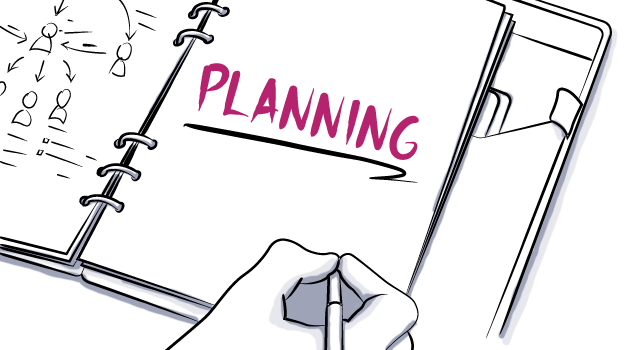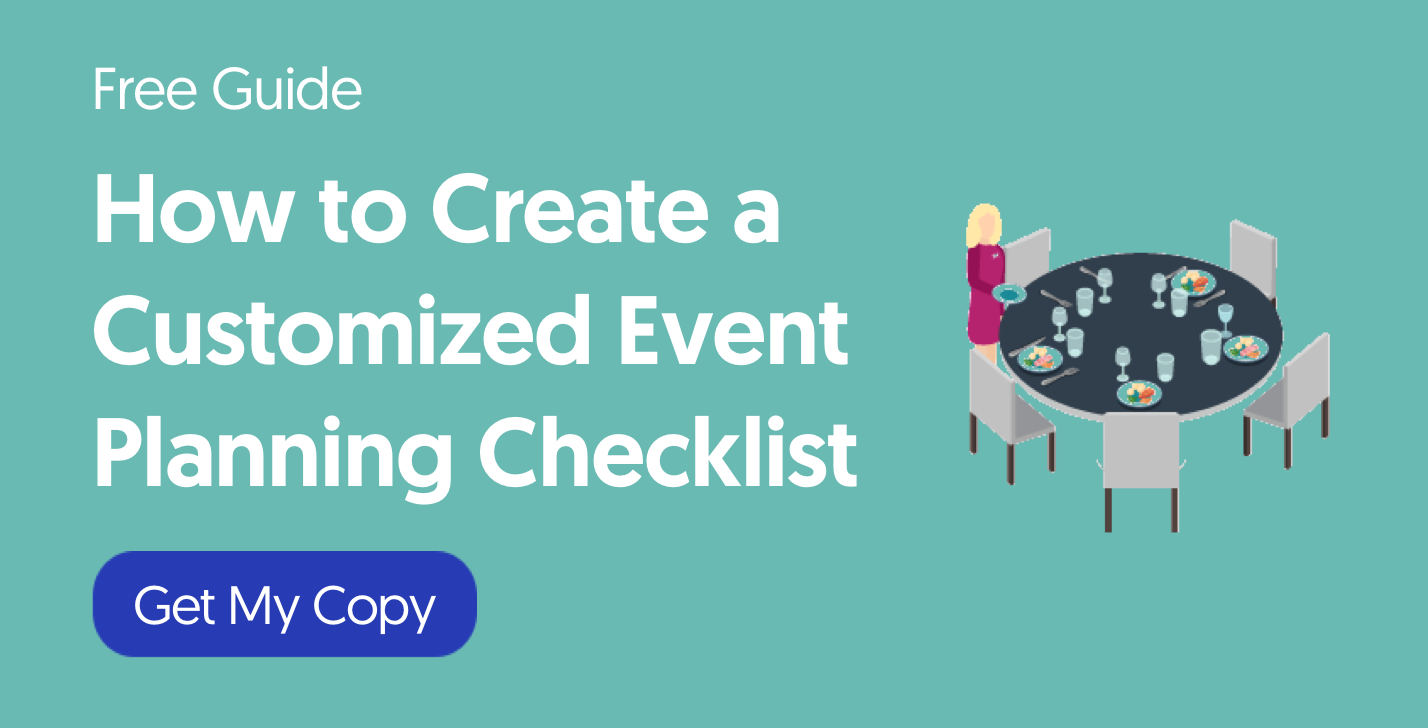
How Do I Get into Event Planning? 5 Ways to Kickstart Your Events Career
Just as there isn’t one route to a great event, there isn’t a single tried and true path that magically leads to a career in event planning. This is a field that thrives on ingenuity, creativity, and constant reinvention. Still, there are smart steps to take to begin the journey, build skills, and make a name for yourself.
Read on for a roundup of the top strategies for kickstarting a successful and rewarding event planning career.
Discover how to begin an event planning career:
1. Build a strong foundation of industry knowledge.
Education is a great way to gain foundational knowledge of the events industry and the overall hospitality industry. Differentiate yourself from other job seekers with an industry-specific educational foundation. You’ll stand out because you made the investment in specialized training. This education is as helpful for starting your own event planning business as it is for getting hired. It’s also a great way to learn the variety of planning jobs in the industry.
Are event planners in high demand?
The events industry is growing”and demand for event planners is expected to grow at a faster-than-average rate of seven percent through 2028.
What kind of degree or certification do you need to be an event planner?
You don’t need a degree to become an event planner, but certain qualifications and certificates can help you get noticed”and hired.
There are dozens of colleges and universities that offer degrees in related fields, stand-alone event courses, meetings designations, and certificate programs. These courses are taught by industry professionals who know the business from the inside out. Whether you pursue a degree in hospitality or take a few certificate programs, take advantage of every networking opportunity they offer.
What skills do event planners need?
An event planner should be:
- Organized
- Open to collaboration
- Willing to adapt
- Creative
- Focused
- Able to multitask
- Good with budgeting
- An excellent communicator
- Composed and calm under pressure
- A networking maven
- Ready to negotiate
- Prepared to travel
Helpful related education for event planners:
- PR and communications
- Marketing
- Design
- Accounting
- Management
2. Parlay all event (and non-event) experience into relevant experience.
Cultivating a diversified experience portfolio”within the events industry, or not”shows you developed a varied and valuable skill set. Do you have food and beverage experience? Your relationship-building skills, food and nutrition knowledge, and multitasking abilities are all strengths. Did you work in retail? Use your people skills and customer insights to design event experiences attendees love. Perhaps you’re the go-to person who creates parties for family and friends.
Review your jobs and your passions for transferable soft skills. Decide how those skills complement the events you want to create and plan, and include them within the experience section of your event planning portfolio.
How to build an event planning portfolio as an events newbie
Put your creativity on display with staged event photos. Does your eye for centerpiece design or creative use of natural elements stand out? Connect with local photographers, bridal shops, furniture rental agencies, local models, and venues to stage events layouts for promotional photos that benefit all groups involved. Take before and after photos to show your work.
Tailor your online presence. Photo galleries, blog posts, and videos are popular among planners”but, rather than tackling all of the platforms to get your message out there, focus on cultivating one or two platforms. The goal isn’t to be everywhere. Exceptional content provides better results.
Use your natural ability as a conversation starter to foster online discussions. Share tips, checklists, and your favorite event planning software with other planners, or put together a video travel blog to highlight the best event venues in your area.
Start a blog and write about what you do as a planner. Network with other planners and offer to write guest blog posts for their pages. Look into the submission guidelines for magazines and other publications and get your work out to them as well.
Roll up your sleeves for a good cause. Charitable organizations can use all hands on deck when it comes to non-profit fundraisers and other charity events. Take the lead or join a committee to gain experience you can add to your portfolio.
Gather testimonials from clients. Ask for recommendations from your personal and professional connections, whether you’ve planned events for them or they have experience working with you otherwise. The right testimonials boost credibility, showing that you can perform as well as you claim.
Embrace different portfolio formats. There is no one best portfolio format. Reach the right clients with a variety of options. A website puts your information at their fingertips, while a physical portfolio is great for in-person meetings. Pinterest lets you gather and share inspiration, which can give clients a sense of your style. Your professional Instagram is a great social calling card for prospective clients.
3. Balance your logistical experience and your creative output.
An outstanding event professional engages their logical side and their creative side in their work.
Logic and logistics are the foundation of successful events. You must be interested in the nitty-gritty details, not just the creative big picture. You’ll be pondering event budgets and floor plan layouts, which require the ability to think and plan logically. Dissatisfied attendees and clients result when events are disorganized or don’t come together with precision.
On the flip side, event planners need to think creatively. This mindset is useful when establishing your business aesthetic, developing event themes, or designing graphics. Your creativity also differentiates your events from others, giving them the wow factor that draws clients. A customized event planning checklist can help you manage logistics while ensuring you schedule enough time to generate those big, show-stopping ideas.
Free resources every new event planner should know:
- Canva is a graphic design platform that makes creating posters, invitations, flyers, and social media graphics a breeze.
- Social Tables offers a variety of event planning tools, from event diagramming to guest management.
- Grammarly offers a free grammar checker that includes tone detection so you can make the best impression when you’re reaching out to potential clients.
- Keep track of your meetings and appointments with Appointlet, an intuitive scheduling app that has a feature-filled free version.
- Create your digital portfolio with a website theme from WordPress”free, if you use a ˜wordpress.com’ branded address, or get even more themes when you connect a wordpress.org account to your hosting and domain name.
- Contact your local SCORE office for business planning help.
- Discover venues, read reviews, compare prices, and get inspiration at Wedding Spot.
4. Plant seeds for an event planning career in a sector you love.
When it comes to hunting for jobs within events, don’t limit yourself. Many types of organizations hold events and are looking to hire professionals that can take on a planning role. Are you passionate about the work of a local non-profit? Volunteer to help their planner, or design events for them yourself. Interested in the arts or healthcare, you can look for associate roles in these organizations to build your portfolio.
Whether you’re working for a pharmaceutical company and planning their annual convention or working for a small restaurant that plans and hosts social events, you are still gaining valuable experience within events.
To grasp the varied opportunities of the events industry, keep these two acronyms in mind:
1. MEEC. This stands for ˜Meetings, Expositions, Events, and Conventions’ markets. MEEC events include travel, hospitality, and corporate events, often with a business-centric spin.
2. SMERF. This stands for ˜Social, Military, Educational, Religious, and Fraternal’ markets. Weddings, bridal showers, birthday parties, and family reunions fall under ˜social,’ and these markets also include recreational activities, alumni events, and sports groups. SMERF markets often involve recreational weekend events.
While planning a weekend rafting trip plus transportation for a group of 25 is a far cry from the elegant events you hope to coordinate, it’s a fantastic way to learn, make connections, and develop your unique event style.

5. Make extensive connections in the events industry.
The number one way to kickstart your career in events is to network, network, network”it’s all about who you know and who knows you. To put yourself out there, attend networking events hosted by hospitality organizations. Networking may seem daunting at first, but it’s an essential skill in this industry.
In-person networking tips for building your event planning career
Learn how to join a conversation. For this, it’s helpful to focus on body language first. As you approach pairs or groups of three or more in conversation, watch for people with stances that are angled slightly ˜open.’ This indicates people are welcome to join the discussion. Bypass a conversation where the participants form a closed circle or have crossed arms.
Commit to starting one or two conversations. Think of discussions like exercise”the more you train, the better you get. Practice conversation starters in low-key environments, such as your local coffee shop or gym, and then move up to networking events.
Develop an open-minded, curious mindset. Networking always works better when you ask genuine questions and share authentic stories about yourself.
Remember proper business card etiquette. While you should always carry your business cards with you, you shouldn’t hand out your business card solely because you’ve had a conversation. You can make meaningful connections when you give your card to someone who asks for it, but passing your card to every person you speak with is the networking equivalent of spamming email inboxes.
Follow up and focus on professional relationship building. Follow up within 24 hours. Remind the person who you are, where you met, and reference the conversation you had. If something they said resonated with you, let them know. If you live near each other, you may choose to invite them out for coffee. Don’t ask for favors right away”instead, forge a connection and build a mutually beneficial relationship. The most valuable networking is a two-way street.
Online networking tips for starting your events career
Know who to contact. When reaching out to events professionals or potential clients via the internet, make sure they’re open to outreach through their social media bios and website profiles. If they’re not interested in solicitation, honor that request. To present a professional vibe, don’t spam them. Hashtags are a great tool for networking. Follow some favorite planners to keep an eye on trends, and engage when appropriate.
Personalize your outreach. Copy-and-paste emails are impersonal”and guaranteed to fail. Instead, do your research: explore LinkedIn, Twitter, website biographies, and more to make sure are reaching out to relevant contacts with a message that will resonate.
Follow up. Again, don’t skip this step, whether you’re networking in-person or online.

How do event planners get their first client?
For many planners, the first client is a friend of the family who needs a creative planner on a budget. But, you need to capture interest beyond your immediate network to build a client base and expand your skills. At this point, you should have a portfolio and an idea of the type of clients you hope to draw. If you haven’t already, create your event business plan and set your fee structure.
Share your portfolio with your networking contacts, and clarify that you are open to referrals. You never know when someone will have a full calendar, and put in a good word for you. Connect with events professionals on Twitter using hashtags and jump in on the conversation.
Potential clients can also find you online through a variety of sources, including:
- Instagram. Your event company’s account should showcase glamour photos of your event design.
- Social shares. To widen your reach in the early days of your business, ask for shares from social media friends and followers.
- YouTube. Film a video that captures your creative process and shows you at work.
- Blog and vlog posts. Share tips and tricks, and offer an introductory package to win business from readers who want someone else to handle the nitty-gritty.
- Online reviews. If you are running your own event planning business, ask for reviews from friends and family who have used you to plan events. Ask them to post their reviews on Yelp and Google Reviews.
When you land a meeting with a potential client, share your skills confidently, without overselling. Describe your experience and show your work”drawing attention to your strengths. Be honest about your limitations, however, you don’t want to say yes to more than you can deliver to perfection.
How do event planners get their foot in the door?
We’ve collected a few origin stories and tips from the founders of world-famous event planning companies to inspire you. The common threads among them? A willingness to take risks, hard work and perseverance, looking for creative inspiration everywhere, and treating each new project as a blank slate.
David Tutera
I had a little shop, I had a singing telegram company. The mother came in one day to see if I could decorate her son’s bar-mitzvah like the window and that was the first child’s party I did.
” From ˜A Day In the Life of a Celebrity Wedding Planner.’ Fast Company
Anabel Fielding
Accept and appreciate the need to take risks, that you’ll get knocked back and have abject failures. That’s just life’s journey. Turn up and never give up.
” From ˜Secrets of my success: Anabel Fielding, chief executive, Quintessentially Events.’ Evening Standard
Yifat Oren
“In the beginning, it was just me working 18 hours a day for four years[¦] The business was definitely built by word of mouth.”
” From ˜Secrets of a Celebrity Wedding Planner: Inside the Million-Dollar Nuptials of Reese Witherspoon, Anne Hathaway and More.’ E! News
Colin Cowie
Each bride is a new opportunity. I focus on the DNA of the couple, the location, time of year and then add to that what you smell, touch, taste, feel and hear. This makes it exciting since every set of circumstances is different. That’s why my work looks so different.
” From ˜Exclusive Interview With Colin Cowie Party Planner to the Stars.’ Celebrity Style Weddings
Get your event planning career started!
There is no sure-fire track to an event planning career. But these five strategies will give you a good jump on the journey. You’ll build skills, gain experience, and establish connections that bring you closer to your event career goals.
Ready to take next steps? Learn how to plan an event in a few simple steps and explore top resources for finding event planning jobs. Or, get started planning events with Social Tables’ free event planning software.
